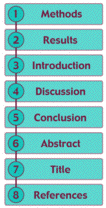

 |
|
|
|
|
||||
 |
|
|||||||
|
|
|
|||||||
|
|
|
|
||||||
|
|
|
|
|
|
|
|
|
|
SelfGuide | ||||||||
 |
SECTION THREE : IntroductionEstablishing a context for the labStep 1: Begin the Introduction with 1 or 2 sentences clearly stating what scientific concept the lab is about. Then finish the paragraph by writing down details about this concept relevant to the lab that you can find in the lab manual, textbook, class notes, handouts, etc . . . Revise your answer so that it includes only the information that relates specifically to this lab. If you have a lot of information, make two paragraphs. Note any citations you use here for including in the References section of your report. Step 2: Write the main objectives of the lab--the specific actions you took in the lab, such as measure, analyze, test--in sentence form. Then complete the paragraph by describing how the achievement of these objectives helped you learn about the scientific concept of the lab. Step 3: State your hypothesis, what you thought the outcome of the experiment would be before you did it. This will be the first sentence of the hypothesis paragraph. To write a scientific hypothesis, you first need to identify the independent and dependent variables in the experiment. Write or sketch your hypothesis, describing the relationship among the variables you listed. Step 4: Continue the paragraph
you began with a hypothesis by explaining how you used your understanding
of the scientific concept of the lab to arrive at your hypothesis.
|
|||
 |
© Copyright
NC State University 2004 Site design by Rosa Wallace Rev. MF 5/26/05 |